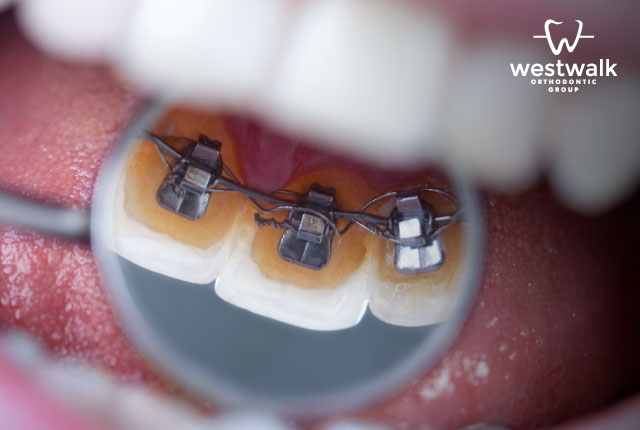How Effective Are Lingual Braces?
Hello there, neighbor! We thought we’d also dedicate some previous time to talking about one of the many alternatives you should know about when considering options for your orthodontic treatment. Have you heard about lingual braces and lingual orthodontics?
As you may already know, conventional metal braces with that notorious stainless steel are far from the only option available to patients who require a teeth alignment procedure. If you have a bad bite, you can also look for more discreet treatment options.
Lingual orthodontics refers to very similar treatment plans to regular orthodontics, meaning specialized care focusing on achieving an ideal relationship between the position of your dental structures and tooth alignment. The main difference, however, is where the orthodontist places the appliances used.
Let’s take a closer look at lingual braces and what you should know about them.
What Are Lingual Braces?
Lingual braces are a type of invisible braces. These appliances typically receive that name because curious onlookers won’t notice you have any orthodontic appliance on when you smile. This option is popular among patients who wish for discreet treatment options.
Something else that’s noteworthy is what their name implies. When dental health professionals talk about your teeth, they may use the term “lingual” to refer to the surface of your teeth that faces your tongue. An orthodontist will bond brackets to the lingual surface of your teeth, hence the name, and that means this type of orthodontic appliance remains hidden from prying eyes.
Other options, such as clear ceramic braces and clear aligners, have various advantages and disadvantages when in direct comparison to lingual braces, but they all serve the same purpose: offering you an option to realign your teeth without the typical metal look on your teeth.
Who Can Use Lingual Braces?
The only way you can tell for sure is to consult with a board-certified orthodontist. Similar to other appliances that favor a more discreet look to them, lingual braces may not be the best option for patients with severe cases of tooth rotation on other malocclusions.
The idea of an initial consultation is that the specialists get a better sense of the potential reasons why you’ve developed a bad bite and how late you are in your bone growth process. Teenagers and adults have different treatment plan considerations, and we need to ensure we think of everything to move your teeth safely.
Lingual braces may break off more often in cases with deep overbites as the teeth will brush against the brackets. Please consult with a qualified orthodontist before you set your mind on any type of orthodontic appliance.
Still, what are some reasons why you should get lingual braces?
- You’re an adult who wants to fix your bite and maintain a professional look in your workplace.
- You have an orthodontic problem you wish to fix.
- Regular contact sports athletes and casual players who prefer to minimize the risk of cuts.
- Players of wind instruments that traditional buccal braces would interfere with.
How Much Are Lingual Braces?
Generally speaking, lingual braces can cost anywhere from $5,000 to $13,000. You can review this article from CostHelper.Com to review some general information about orthodontic treatment costs.
We’re sorry, but there’s no way we can give you a specific amount for your treatment cost without first looking at your case. Whenever you visit an orthodontist who installs lingual braces, you will notice they have to consider many factors before providing you with a final quote.
Your treatment’s cost will vary depending on a couple of things like:
- How long it takes,
- The location you live in,
- Available insurance coverage,
- Appliance customization.
How to Clean Your Teeth With Lingual Braces?
As you may already know, keeping your teeth clean is crucial for the success of your treatment. Keep in mind too that, whatever type of appliance you choose, you’ll always have to pay additional attention to your oral hygiene during your orthodontic care.
Use a soft-bristled toothbrush to remove any food debris that gets stuck in between your brackets and wires. We want to remove any potential sources of food for the harmful bacteria that create plaque and cause bad breath with braces.
Please brush your teeth after every meal and brush with a sweeping upwards motion from the back of your teeth. Pay close attention to brushing your teeth at the gum line and around each bracket. Toothbrushes with a narrow tip are better at cleaning teeth when the patient wears lingual braces.
Don’t forget to use dental floss and rinse your mouth with a fluoride mouthwash when you’re done brushing your teeth.
Where to Get Help?
As a premier provider of orthodontic treatment solutions for Darien residents, we want to help you reach your treatment goals. The talented team at Westwalk Orthodontics can help you have a healthy and well-aligned smile with other treatment options.
If you want to learn more about Invisalign clear braces for your orthodontic treatment, you should read other articles on our blog. Likewise, you can click this link if you want to learn all about clear ceramic braces in Darien.
Get in touch with us for more information.

